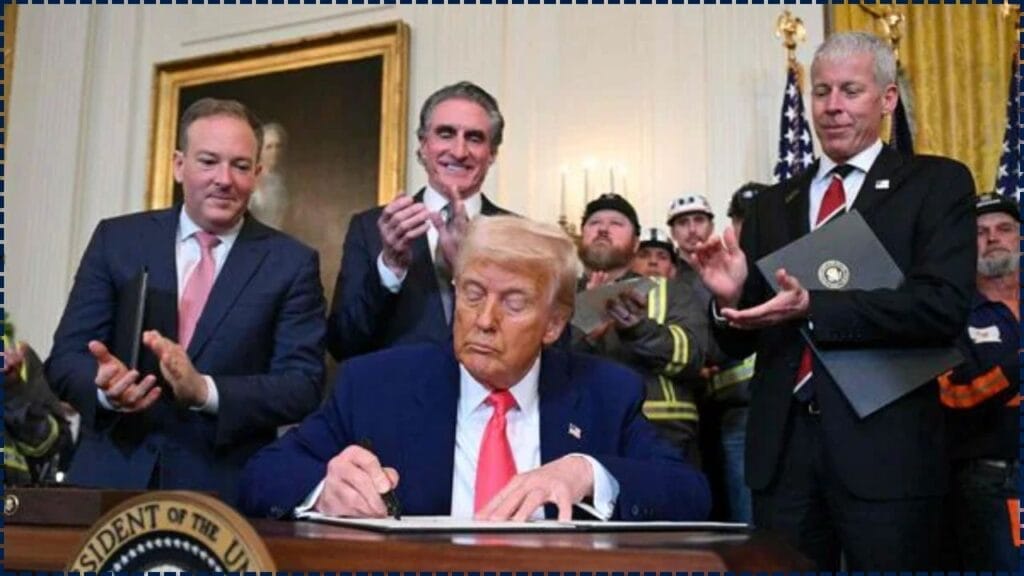President Trump’s freshly branded economic package, dubbed the “One Big Beautiful Bill Act”, is making waves — and not just the good kind. While it promises tax breaks, job growth, and more money in the pockets of working families, a lot of folks in the GOP are quietly (and not-so-quietly) sweating bullets over what could come next. This big bill might blow up in the party’s face.

Here’s the lowdown on what the bill actually does, why it’s giving some Republicans heartburn, and what it could mean for everyday Americans from all walks of life.
Trump’s ‘Big Beautiful Bill’ Could Backfire Spectacularly
| Topic | Details |
|---|---|
| Bill Name | One Big Beautiful Bill Act (Unofficial) |
| House Vote | Passed 215-214, along party lines |
| Debt Impact | Estimated $3.8 trillion increase over 10 years (CBO) |
| Key Features | Tax cut extensions, SALT cap raised, tip/overtime exemptions |
| Concerns | Medicaid/SNAP cuts, debt ceiling hike, Senate GOP resistance |
| Official Sources | PBS, CBO.gov, NYP |
Trump’s “Big Beautiful Bill” might look good on paper, but it’s loaded with potential problems. From budget blowouts to benefit cuts, it’s got enough drama to make even seasoned Republicans sweat. Whether it turns into a win or a washout depends on what happens next in the Senate. For now, it’s one big, beautiful question mark.
What Is Trump’s “Big Beautiful Bill” Really About?
This bill aims to make Trump-era tax cuts permanent, scrap income taxes on tips and overtime pay, and give wealthier households in high-tax states a SALT deduction break. There’s also a healthy dose of spending cuts tacked on to help pay for it — at least in theory.
Trump calls it the “best thing to happen to the middle class since sliced bread.” Critics (including some Republicans)? Not so much.
What’s Inside the Bill?
1. Tax Cuts Extended
The 2017 tax cuts, originally set to expire in 2025, would be made permanent. That includes lower income tax brackets, expanded child tax credits, and cuts for corporations.
2. Tip and Overtime Tax Elimination
Workers who earn tips and overtime would no longer pay federal income tax on that money. Sounds great, but it’s also expensive: the Joint Committee on Taxation estimates this could cost $475 billion over the next decade.
3. SALT Deduction Raised
The state and local tax deduction cap would jump from $10,000 to $40,000 for households earning under $500,000. That’s a win for folks in high-tax states like New York or California — and a sore spot for fiscal conservatives.
4. Spending Cuts That Aren’t Cutting It
The bill claims to trim spending, but CBO analysis shows that most of the offset comes from unspecified future reductions and proposed cuts to Medicaid and SNAP (food stamps). These cuts could affect millions.
Why Some Republicans Are Worried
1. Ballooning the National Debt
Fiscal hawks like Senator Rand Paul have blasted the bill for raising the debt ceiling by $5 trillion with only modest reductions in spending.
“This is big government wrapped in a tax cut,” Paul told Politico.
That’s not sitting well with conservative voters who care about debt and deficits.
2. It Could Sink the Senate Vote
The House passed the bill by just one vote. Over in the Senate, Senators Ron Johnson, Susan Collins, and Lisa Murkowski have all raised concerns about:
- Medicaid cuts affecting rural hospitals
- SNAP cuts hurting working-class families
- SALT cap changes that benefit the wealthy
Unless major changes are made, this bill might never see the president’s desk.
3. 2026 Midterms Are Looming
If this bill backfires, it could hurt GOP chances in swing districts. Democrats are already framing it as a “tax cut for the rich” that punishes working-class Americans.
What Could This Mean for You?
1. You Might Pay Less in Taxes
If you work a tipped job or earn overtime, this bill could put more money in your pocket — at least in the short term.
2. You Could Lose Benefits
If you rely on Medicaid, SNAP, or live in a rural area, service cuts could affect your healthcare access or food security.
3. Your State Taxes Could Shift
Wealthier households in blue states might see their federal tax bills drop significantly due to the SALT cap hike.
Trump’s ‘Big Beautiful Bill’ Could Backfire Spectacularly: What Happens Next?
1. Senate Review
The Senate is now picking the bill apart. Revisions will likely be required before it moves forward.
2. Public Hearings
Expect town halls, Senate Finance Committee debates, and lots of political ads.
3. Possible Amendments
Key provisions may be watered down to win over moderate senators.
4. Vote or Veto
If the Senate passes a modified bill, it heads to the president. If not, it’s back to the drawing board.
FAQs
Q: What is the “Big Beautiful Bill”?
It’s a nickname for Trump’s latest economic legislation that includes tax cuts, spending adjustments, and other reforms.
Q: How much will this bill add to the national debt?
Roughly $3.8 trillion over 10 years, according to the Congressional Budget Office.
Q: Will this cut my taxes?
If you earn tips, overtime, or live in a high-tax state, yes. But the benefits vary based on your income.
Q: Are Republicans united behind the bill?
No. Some moderate and fiscal conservatives oppose parts of it, especially Medicaid and food assistance cuts.
Q: Is this bill likely to pass the Senate?
Not in its current form. GOP leaders say they need to revise it to secure enough votes.








